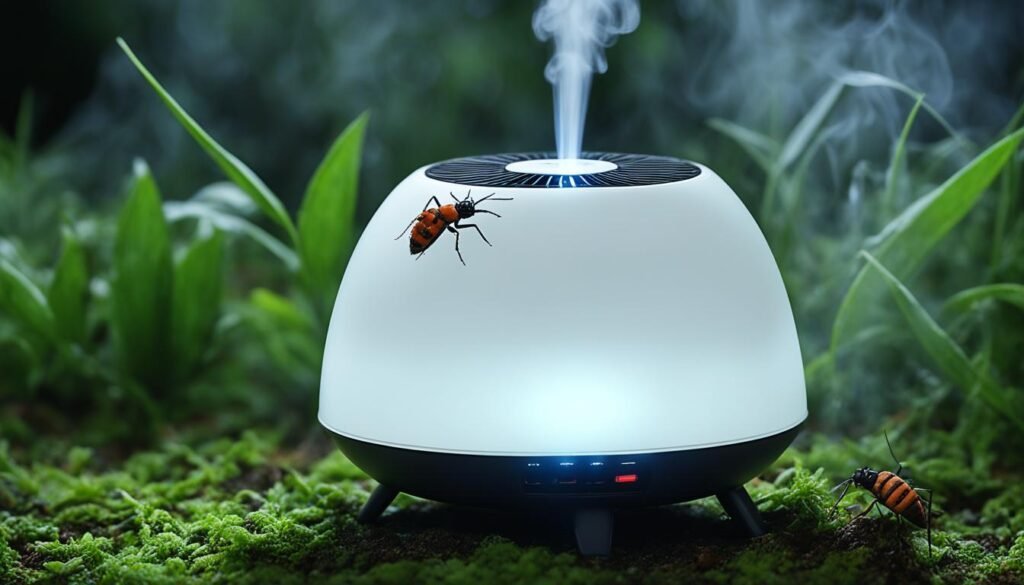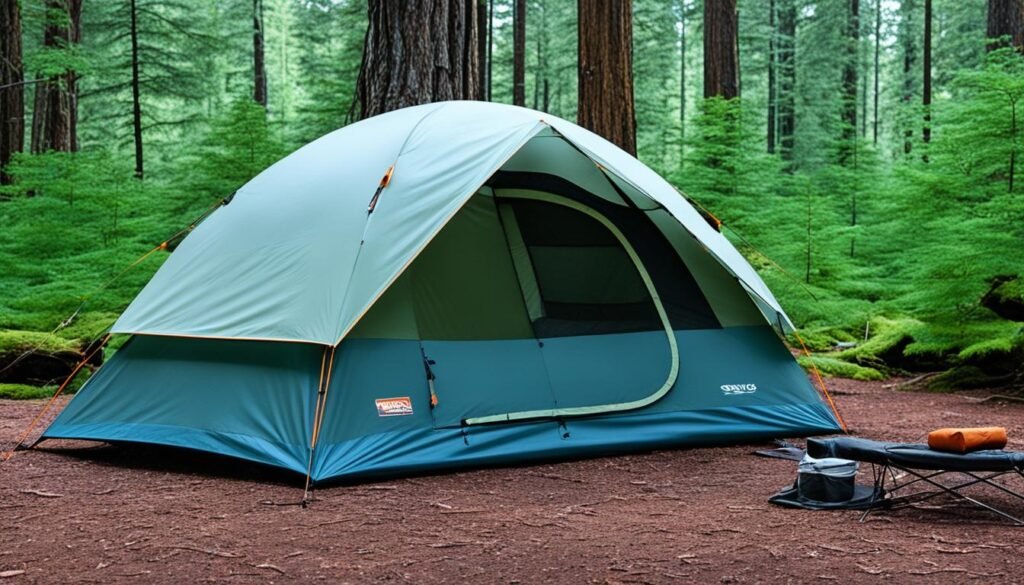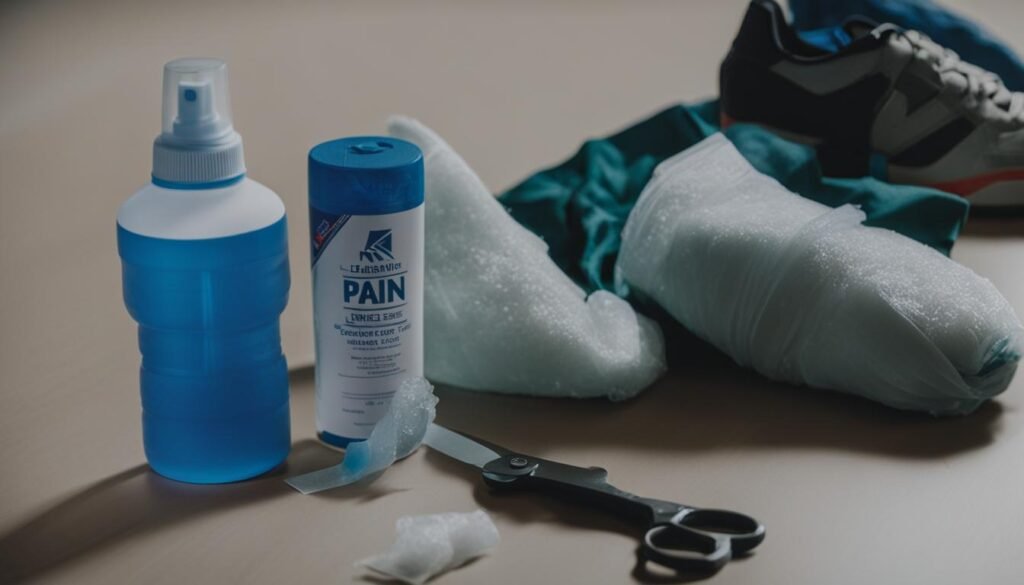Camping is a popular way to enjoy the outdoors and connect with nature. However, bugs can often be a nuisance during camping trips. By implementing effective bug-proofing strategies, you can keep insects out of your tent and ensure a peaceful and insect-free camping experience. In this article, we will explore various methods and techniques to prevent bugs from entering your tent, allowing you to fully enjoy your time in nature.
Key Takeaways:
- Learn how to keep bugs out of your tent during camping trips.
- Implement bug-proofing strategies to ensure a peaceful camping experience.
- Explore various methods, such as traditional bug sprays, homemade repellents, and natural deterrents.
- Understand the types of bugs you may encounter while camping and ways to repel them.
- Make use of bug-repelling tools like bracelets, diffusers, and candles.
Understanding the Types of Bugs You May Encounter While Camping
When camping, it’s important to be aware of the types of bugs you may encounter. Common bugs that campers often come across include mosquitoes, flies, bees, spiders, and ants. Mosquitoes, in particular, can be a major annoyance and their bites can cause itchy bumps. It’s essential to take preventive measures to keep bugs, especially mosquitoes, away from your campsite and tent.
“I couldn’t enjoy my camping trip because of the persistent buzzing and biting of mosquitoes. It was unbearable, and I ended up covered in itchy red welts. Take it from me, being prepared to fend off bugs will make your camping experience much more enjoyable.” – Sarah Thompson, experienced camper
Common Camping Bugs
Here are some of the common bugs you may encounter while camping:
- Mosquitoes
- Flies
- Bees
- Spiders
- Ants
Among these, mosquitoes can be the most troublesome due to their incessant biting and potential for transmitting diseases.
| Bug | Description | Dangers |
|---|---|---|
| Mosquitoes | Small flying insects that suck blood from humans and animals | Potential for spreading diseases like dengue, Zika, and West Nile virus |
| Flies | Insects known for their buzzing and irritating presence | Possibility of contamination and spreading of germs |
| Bees | Stinging insects that play an important role in pollination | Possible allergic reactions to stings |
| Spiders | Arachnids with eight legs that prey on insects | Potential for bites that can cause discomfort or allergic reactions |
| Ants | Small six-legged insects that live in colonies | Possible irritation from bites or contamination of food |
To ensure a pleasant and bug-free camping experience, it’s crucial to take proactive measures to prevent these common camping bugs from invading your campsite and tent.
Traditional Bug Sprays or Creams
When it comes to repelling bugs, traditional bug sprays or creams are a tried and true method. These products contain a common ingredient called DEET, which is known for its effectiveness in repelling insects. DEET-based bug sprays and creams are especially effective against mosquitoes, making them a must-have for camping trips.
Choosing a bug spray or cream with a high concentration of DEET is key to maximizing effectiveness. Look for products with a DEET concentration of at least 20% to ensure long-lasting protection against mosquitoes and other pesky bugs.
While DEET-based bug sprays and creams are highly effective, some individuals may have concerns about the smell or potential skin irritation associated with DEET. If you’re looking for alternative options, there are natural bug repellents available as well.
Table: Comparison of Bug Sprays and Creams
| Bug Spray/Cream | Active Ingredient | Pros | Cons |
|---|---|---|---|
| DEET-based | DEET |
|
|
| Natural Bug Repellent | Essential oils (e.g., citronella, lavender, eucalyptus) |
|
|
Choosing the Right Bug Spray or Cream
When selecting a bug spray or cream, consider your specific needs and preferences. If you’re camping in an area with high mosquito activity, a DEET-based product may be the best choice for maximum protection. However, if you prefer a more natural approach or have concerns about DEET, opt for a bug repellent containing essential oils.
Remember to always read and follow the instructions on the product label to ensure proper use. Apply bug sprays and creams to exposed skin and clothing, taking care to avoid sensitive areas such as the eyes and mouth.
“Traditional bug sprays and creams with DEET are highly effective in repelling mosquitoes and other insects. However, natural bug repellents containing essential oils provide a gentler alternative for those with sensitivity to DEET.”
By choosing the right bug spray or cream and applying it correctly, you can enjoy your camping experience without the annoyance of bugs buzzing around.
Homemade Essential Oil Repellent
When it comes to keeping bugs at bay, homemade essential oil repellents are a natural and effective solution. Essential oils have long been known for their bug-repelling properties, making them an ideal choice for those seeking a chemical-free alternative to conventional bug sprays.
By combining essential oils with other ingredients like rubbing alcohol and witch hazel, you can create your own homemade bug repellent that is safe, affordable, and environmentally friendly. This natural bug spray can be applied to your clothes and belongings to help deter bugs from approaching.
There are several essential oils that are particularly effective at repelling bugs. These include:
- Thyme: Known for its strong scent, thyme essential oil is effective against mosquitoes and other flying insects.
- Eucalyptus: The strong aroma of eucalyptus oil can help keep mosquitoes, ticks, and other pests away.
- Cedarwood: Cedarwood essential oil acts as a natural insect deterrent, particularly against moths and other fabric-eating bugs.
- Sage: Sage oil is known for its ability to repel mosquitoes and other flying insects.
- Catnip: Catnip essential oil is highly effective at repelling mosquitoes and other biting insects.
- Geranium: Geranium oil is a powerful bug repellent that works against mosquitoes, ticks, and other pests.
- Lemongrass: The citrusy scent of lemongrass oil repels mosquitoes and other flying insects.
- Rosemary: Rosemary oil is effective against mosquitoes and can also help repel ticks.
By using a combination of these essential oils in your homemade bug repellent, you can create a powerful and all-natural barrier against annoying bugs.
To make your own essential oil bug spray, follow these simple steps:
- In a spray bottle, combine 10-15 drops of your chosen essential oils with 2 ounces of witch hazel or rubbing alcohol.
- Add 2 ounces of water to the mixture and shake well to combine.
- Before use, always perform a patch test on a small area of skin to check for any potential allergic reactions.
- Apply the bug spray to your clothing and exposed skin, avoiding contact with your eyes and mouth.
- Reapply as needed, especially after swimming or sweating.
This homemade essential oil repellent is not only effective at keeping bugs away, but it also has a pleasant and refreshing aroma, unlike the strong and often unpleasant smell of conventional bug sprays.
Using a homemade essential oil repellent allows you to protect yourself from bugs while avoiding the use of potentially harmful chemicals found in commercial bug sprays. It is important to note that essential oils should be used with caution and in moderation, as they can be irritating to the skin in high concentrations.
Next time you venture into the great outdoors, try making your own natural bug spray and enjoy the benefits of a chemical-free, effective solution for keeping bugs at bay.
Vinegar
Vinegar is an effective and natural bug repellent that can help keep insects away from your camping area. Both white vinegar and apple cider vinegar have strong scents that insects dislike, making them excellent deterrents. You can use vinegar in multiple ways to repel bugs while camping.
To create a vinegar bug spray, you can infuse dried herbs such as lavender, sage, mint, rosemary, and thyme in vinegar for a few weeks. This mixture combines the bug-repellent properties of the herbs with the strong scent of vinegar, creating a potent natural bug spray. Simply strain the herbs from the vinegar and transfer the liquid to a spray bottle. Spray this vinegar bug spray around your tent, camping area, and even directly on your skin to create a barrier against insects.
If you don’t want to make a vinegar bug spray, you can also spray vinegar directly on your skin or around your camping area. The acidic properties of vinegar make it an unpleasant environment for bugs, deterring them from approaching. However, keep in mind that the strong smell of vinegar may not be pleasant for everyone, so it’s important to consider personal preferences and sensitivities.
Bug-Repelling Bracelets
Bug-repellent bracelets are a convenient option for those who prefer not to apply bug repellent directly to their skin or clothing. These wearable insect repellents emit bug-repelling chemicals into the air, creating a perimeter of protection around you.
You can wear bug-repellent bracelets on your wrist or attach them to nearby objects. By wearing these mosquito repellent bracelets or placing them in strategic locations, such as around your campsite or picnic area, you can effectively deter bugs and enjoy your outdoor activities without constant interruptions.
These bug deterrent wristbands are especially suitable for children who may not tolerate bug sprays well. The colorful and fun designs of these bug-repellent bracelets make them appealing to kids, while providing the much-needed protection against insects.
With bug-repellent bracelets, you no longer have to worry about the hassle of messy bug sprays or the unpleasant smell that comes with them. Simply put on the bracelet, and you’re ready to enjoy your time outdoors without the annoyance of bugs buzzing around.
Advantages of Bug-Repelling Bracelets:
- Convenient and easy to use
- No need for direct application to the skin or clothing
- Create a perimeter of bug protection
- Suitable for children who may not tolerate bug sprays
- No mess or strong odor
- Reusable and long-lasting
When selecting bug-repellent bracelets, look for wearable insect repellents that are made from high-quality materials and have a long-lasting effect. It’s important to follow the manufacturer’s instructions for proper use and storage to ensure maximum effectiveness.
Now you can enjoy your outdoor adventures without the constant swatting and itching. Bug-repellent bracelets provide a hassle-free and effective solution to keep bugs at bay, allowing you to fully immerse yourself in nature.
Bug-Repelling Diffusers and Coils
When it comes to keeping bugs at bay during your camping trip, bug-repelling diffusers and coils can be valuable tools. These devices are specifically designed to emit chemicals that repel mosquitoes and other insects, ensuring a more enjoyable outdoor experience.
Bug-repelling diffusers are equipped with a battery-operated fan that efficiently spreads the repelling chemicals, such as metofluthrin, in a designated area. This long-lasting protection helps create a bug-free zone around your campsite, allowing you to relax and unwind without worrying about pesky insects.
Another effective option is pyrethrum-infused coils. These coils release a mosquito-repelling scent when burned and can be strategically scattered around your campsite for additional protection. The pleasant aroma not only keeps bugs away but also adds a cozy ambiance to your camping experience.
Benefits of Bug-Repelling Diffusers and Coils:
- Efficiently repel mosquitoes and other insects
- Create a bug-free zone around your campsite
- Provide long-lasting protection with bug-repelling chemicals
- Add a pleasant aroma to your camping experience
- Easy to use and portable
- Available in a variety of options to suit your needs
“Bug-repelling diffusers and coils are essential camping accessories that ensure a peaceful and bug-free environment. By effectively repelling mosquitoes and other insects, they allow campers to fully enjoy their time in nature without the annoyance of bites and buzzing.”
So, whether you choose bug-repelling diffusers with battery-operated fans or pyrethrum-infused coils that release a mosquito-repelling scent, these tools are valuable in keeping bugs at bay during your camping adventure. Combine them with other bug-proofing strategies to create a safe and comfortable outdoor haven where you can relax and embrace the beauty of nature.

Foods That Repel Bugs
When it comes to keeping bugs at bay while camping, certain foods can play a crucial role. These natural insect deterrents can be easily incorporated into your meals, helping to keep bugs away from your campsite and tent. In this section, I will discuss a few key foods that are known for their bug-repelling properties:
Onions
Onions have a strong scent that many insects find unpleasant. Incorporating onions into your meals while camping can help deter bugs from approaching. Whether you chop them up for a savory omelet or use them as a flavor-enhancing ingredient in your campfire stew, onions can be an effective natural bug deterrent.
Garlic
Similar to onions, garlic emits a potent odor that bugs dislike. Adding garlic to your cooking not only enhances the flavor but also acts as a natural bug repellent. Whether you’re grilling garlic-infused shrimp skewers or making a delicious garlic and herb marinade for your chicken, incorporating garlic into your meals can help keep bugs away.
Citrus Fruits
Lemons and oranges are not only refreshing and hydrating fruits to enjoy while camping but also natural bug-deterring foods. Bugs are often repelled by the scent and taste of citrus fruits. Squeeze some fresh lemon juice onto your grilled meats or pack some juicy oranges as a snack to help repel bugs naturally.
If you want to take your bug repellent game up a notch, consider using these ingredients directly on your skin. Rubbing garlic or onion slices on your skin or even using citrus peels as a bug repellent offers a simple and natural solution to keep bugs away while enjoying your camping adventure.
By incorporating bug-repelling foods into your camping meals and utilizing them as natural insect deterrents, you can create a more enjoyable and bug-free outdoor experience. These simple yet effective measures can help you keep bugs at bay, allowing you to fully immerse yourself in the beauty of nature without the annoying presence of insects.
Garlic Capsules
If you prefer not to directly apply garlic to your skin, another option is to take garlic capsules. When ingested, garlic capsules cause your body to release a scent through your pores that repels insects. This can help protect you from bug bites while camping. However, keep in mind that the smell of garlic may also repel humans, so be prepared for the potential effects on those around you.
Hydration
Staying hydrated while camping is crucial for a variety of reasons, including bug prevention. Insects are naturally attracted to sweat, particularly in hot weather. By drinking an ample amount of water and maintaining hydration, you can reduce sweating and decrease the likelihood of attracting bugs. It is important to consume water regularly, especially during outdoor activities and hikes, to stay cool and avoid overheating.
Drinking water not only helps keep you hydrated but also assists in repelling bugs. Insects are inclined to be drawn to individuals who are dehydrated or have higher sweat levels. By preventing dehydration, you make yourself less appealing to bugs, minimizing the risk of bug bites and interference during your camping experience.
It is advised to carry a refillable water bottle with you and make a conscious effort to drink water consistently throughout the day. Set a reminder if needed to ensure you’re staying properly hydrated. Remember, prevention is key, and staying hydrated is a simple yet effective way to stay bug-free during your camping trip.
| Benefits of Staying Hydrated While Camping |
|---|
| 1. Prevents dehydration |
| 2. Reduces sweating and minimizes bug attraction |
| 3. Helps repel bugs and prevent bug bites |
| 4. Improves overall camping experience |
Mint
Mint, particularly spearmint and peppermint, is a natural bug repellent. Bugs are repelled by the strong scent of mint, making it an effective deterrent. There are several ways to incorporate mint into your camping routine:
- Keep potted mint plants around your campsite to naturally ward off bugs.
- Use mint toothpaste or mouthwash, as the minty aroma can help prevent bugs from approaching your face and mouth.
- Rub mint leaves on your skin before heading outdoors to create a minty barrier against bugs.
Camping with mint is a refreshing way to repel bugs and enjoy the great outdoors without the nuisance of insects.
See the image below to get a visual idea of how mint can be used to repel bugs:

Benefits of Using Mint as a Bug Repellent
Mint offers several advantages as a bug repellent:
- Effective natural deterrent: Bugs, including mosquitoes and flies, are repelled by the strong scent of mint, making it a natural and effective bug repellent.
- Pleasant aroma: Mint has a refreshing and pleasant smell, unlike chemical-based bug sprays. It adds a pleasant fragrance to your camping area.
- Accessible and affordable: Mint is readily available in various forms, such as fresh leaves, potted plants, toothpaste, and mouthwash, making it an easily accessible and affordable bug repellent option.
- Multi-purpose use: Mint has additional benefits beyond bug repellent. It can freshen your breath, provide a cooling sensation, and be used in various culinary applications.
Overall, utilizing mint as a bug repellent is a natural and effective solution that can enhance your camping experience by keeping unwanted bugs at bay.
Fresh and Dried Herbs
Fresh and dried herbs are a fantastic natural solution for deterring bugs while camping. Not only do they add flavor to your meals, but they also serve as effective bug repellents. There are several ways you can utilize herbs to keep bugs away during your camping trip.
Burning Herbs to Repel Bugs
One method is burning herbs, creating a smoke that repels bugs. Popular herbs for this purpose include sage, rosemary, eucalyptus, and mint. Simply gather a small bundle of these herbs, light them, and let the smoke spread throughout your campsite. The strong scent will help keep insects at bay, allowing you to enjoy bug-free evenings by the fire.
Rubbing Herbs on Skin
Another option is to rub fresh or dried herbs directly on your skin. This acts as a quick and natural bug-repelling solution. Herbs like mint and rosemary are particularly effective due to their strong scents. Rubbing these herbs on your skin not only helps repel bugs but also leaves you smelling fresh and fragrant.
Natural Bug Deterrent with Herbs
Aside from burning and rubbing, you can also use herbs as a natural bug deterrent by placing them strategically around your campsite. For example, scatter sprigs of rosemary or mint in areas that tend to attract bugs, such as near food or seating areas. The potent aroma of these herbs will discourage insects from approaching, creating a bug-free zone for your camping experience.
By incorporating fresh and dried herbs into your camping routine, you can effectively repel bugs while enjoying the great outdoors. Whether it’s burning herbs to create a bug-repelling smoke, rubbing them on your skin, or strategically placing them around your campsite, herbs provide an easily accessible and natural bug deterrent solution.
Candles, Lanterns, and Campfires
When it comes to keeping bugs at bay during your camping trip, candles, lanterns, and campfires can be your allies. Bugs are naturally repelled by smoke, making these sources of smoke effective bug deterrents. By utilizing these methods in your camping area, you can create a barrier that keeps insects away from your campsite and, more importantly, your tent. Additionally, the light emitted from candles and lanterns can attract bugs away from your sleeping space, reducing the risk of them entering your tent.
One option to repel bugs is to use bug-repelling candles. These candles are specially formulated with bug-repelling ingredients such as citronella, lemongrass, or eucalyptus. The scent of these candles is disliked by insects, keeping them at bay. Place bug-repelling candles strategically around your campsite to create a bug-free zone and enjoy your camping experience without the annoyance of insect bites.
Lanterns can also serve as bug protection tools. Opt for lanterns that are designed to repel bugs by using bug-repelling fuel or by incorporating bug-repelling technology. These lanterns can emit a bug-repelling scent or create a protective barrier through the smoke they generate. Depending on the design, you may also have the option to hang your lantern up high to attract bugs away from your campsite.
| Candles, Lanterns, and Campfires | Advantages |
|---|---|
| Bug-repelling candles |
|
| Bug-repelling lanterns |
|
| Campfires |
|
| Campfire smoke |
|
Lastly, a campfire not only provides warmth and the opportunity for cooking, but it also repels bugs through the smoke it generates. Bugs are naturally repelled by smoke, making a campfire an effective deterrent. The smoke acts as a barrier, keeping insects away from your campsite. As an added benefit, the flickering flames of a campfire can create a cozy atmosphere, perfect for gathering around with friends and family.
Conclusion
Bug-proofing your tent is essential for a pleasant and bug-free camping experience. By implementing the various bug prevention strategies discussed in this article, you can effectively keep insects out of your tent and enjoy your time in nature without the annoyance of bugs. Whether you choose traditional bug sprays, homemade essential oil repellents, or other natural methods, there are numerous options available to suit your preference and ensure an insect-free camping trip.
Remember to choose an insect-proof tent, inspect and seal off any openings, and choose the right location for your campsite to further enhance bug prevention. With these strategies in place, you can camp with peace of mind and focus on enjoying the beauty of the great outdoors.
FAQ
How can I keep bugs out of my tent while camping?
There are several effective ways to keep bugs out of your tent while camping. Some options include using bug sprays or creams, creating homemade essential oil repellents, using vinegar as a natural bug repellent, wearing bug-repellent bracelets, utilizing bug-repelling diffusers and coils, incorporating bug-repelling foods into your meals, taking garlic capsules as a bug deterrent, staying hydrated, using mint as a bug repellent, burning fresh and dried herbs, and keeping candles, lanterns, or a campfire nearby to repel bugs.
What types of bugs are commonly found while camping?
When camping, you may encounter various bugs, including mosquitoes, flies, bees, spiders, and ants. These bugs can be a nuisance and may disrupt your camping experience. Taking preventive measures to repel these insects is essential for a bug-free camping trip.
Are bug sprays or creams effective in repelling bugs?
Yes, bug sprays or creams are a popular and effective method to repel bugs. Most bug sprays or creams contain DEET, a common ingredient known for its effectiveness in repelling insects. DEET-based products, especially those with a high concentration of DEET, are particularly effective against mosquitoes. However, if you have concerns about DEET, there are natural alternatives available, such as essential oil repellents.
How can I make a homemade bug repellent using essential oils?
You can create a homemade bug repellent using essential oils by mixing them with other ingredients such as rubbing alcohol and witch hazel. Some effective essential oils for repelling bugs include thyme, eucalyptus, cedarwood, sage, catnip, geranium, lemongrass, and rosemary. Applying this natural bug spray to your clothes and belongings can help deter bugs from approaching.
Can vinegar be used as a natural bug repellent?
Yes, vinegar can be used as a natural bug repellent. Both white vinegar and apple cider vinegar can be effective in repelling bugs. You can spray vinegar directly on your skin, around your tent, and in your camping area to create a barrier against insects. Additionally, you can make a vinegar-based bug spray by infusing dried herbs such as lavender, sage, mint, rosemary, and thyme in vinegar for a few weeks. However, the strong smell of vinegar may not be pleasant for everyone.
How do bug-repellent bracelets work?
Bug-repellent bracelets emit bug-repelling chemicals into the air, creating a perimeter of protection around you. You can wear them on your wrist or attach them to nearby objects. Bug-repellent bracelets are a convenient option for those who prefer not to apply bug repellent directly to their skin or clothing. They are especially suitable for children who may not tolerate bug sprays well.
What are bug-repelling diffusers and coils?
Bug-repelling diffusers and coils are effective tools to keep bugs away from your camping area. These devices emit chemicals such as metofluthrin that repel mosquitoes and other insects. Bug-repelling diffusers often come with a battery-operated fan that spreads the chemical in a designated area, providing long-lasting protection. Pyrethrum-infused coils release a mosquito-repelling scent when burned and can be scattered around your campsite for additional protection.
Are there any foods that repel bugs?
Yes, certain foods are known to repel bugs due to their scent or taste. Onions, garlic, and citrus fruits like lemons and oranges are disliked by many insects. You can incorporate these ingredients into your meals to help keep bugs away. Additionally, rubbing garlic, onions, or citrus peels on your skin can act as a simple and natural bug repellent.
How can garlic capsules help repel bugs?
Ingesting garlic capsules causes your body to release a scent through your pores that repels insects. This can help protect you from bug bites while camping. However, keep in mind that the smell of garlic may also repel humans, so be prepared for the potential effects on those around you.
Why is staying hydrated important for bug prevention?
Insects are often attracted to sweat, especially in hot weather. By drinking plenty of water and staying hydrated, you can reduce sweating and minimize the likelihood of attracting bugs. It’s important to drink water regularly, especially during outdoor activities and hikes, to stay cool and avoid overheating.
How can mint be used as a natural bug repellent?
Mint, particularly spearmint and peppermint, is a natural bug repellent. Bugs are repelled by the strong scent of mint, making it an effective deterrent. There are several ways to incorporate mint into your camping routine, such as keeping potted mint plants around your campsite, using mint toothpaste or mouthwash, or even rubbing mint leaves on your skin. These methods can help create a minty barrier against bugs.
Are there any herbs that work as natural bug deterrents?
Yes, fresh and dried herbs can serve as natural bug deterrents. Burning herbs like sage, rosemary, eucalyptus, and mint can create smoke and a scent that repels bugs. You can also rub these herbs directly on your skin for a quick and natural bug-repelling solution. Herbs are an easily accessible and effective way to keep bugs away while camping.
Can candles, lanterns, and campfires repel bugs?
Yes, candles, lanterns, and campfires can help repel bugs through the smoke they generate. Bugs are generally repelled by smoke, so having a fire or burning bug-repelling candles or lanterns in your camping area can help keep insects away. Additionally, the light from these sources can attract bugs away from your tent, reducing the likelihood of them entering your sleeping space.
How can I bug-proof my tent?
Bug-proofing your tent is essential for a pleasant and bug-free camping experience. In addition to using bug-prevention strategies mentioned above, you can choose an insect-proof tent, inspect and seal off any openings, and choose the right location for your campsite to further enhance bug prevention.







